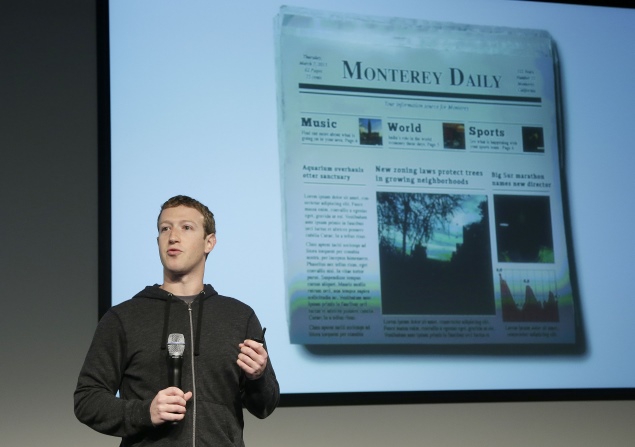Facebook updates News Feed to display more news
Advertisement

Facebook is boosting its efforts to put more news in its News Feed.
That is, real news from the news media, rather than status updates from friends.
The world's biggest social network, cognizant of its growing importance for discovering news, said in a blog post on Monday that it is revising the way it delivers information to its billion-plus users.
"People use Facebook to share and connect, including staying current on the latest news, whether it's about their favourite celebrity or what's happening in the world," said the blog post from Facebook engineering manager Varun Kacholia and software engineer Minwen Ji.
"We've noticed that people enjoy seeing articles on Facebook, and so we're now paying closer attention to what makes for high quality content, and how often articles are clicked on from News Feed on mobile. What this means is that you may start to notice links to articles a little more often (particularly on mobile)."
Advertisement
(Also see: Facebook's News Feed revamp puts 'mobile first')
The blog noted that "our surveys show that on average people prefer links to high quality articles about current events, their favourite sports team or shared interests, to the latest meme."
Advertisement
And Facebook will tweak the way its displays articles in user News Feeds: "This means that high quality articles you or others read may show up a bit more prominently in your News Feed, and meme photos may show up a bit less prominently," the engineers wrote.
They added that Facebook will also "show people additional articles similar to ones they had just read."
Advertisement
"Soon, after you click on a link to an article, you may see up to three related articles directly below the News Feed post to help you discover more content you may find interesting," they said.
But to avoid diminishing the updates from friends, Facebook will revise its "bumping," which means that after a user reads an article it may not show up again in the News Feed unless there are new comments from friends.
A study earlier this year showed Facebook is becoming a key source of news for users of the huge social network, even if people discover articles mostly by happenstance.
The study by the Pew Research Center, in collaboration with the Knight Foundation, found 64 percent of US adults use Facebook, and nearly half of those get some news from the service. That amounts to 30 percent of the overall US population who are "Facebook news consumers," Pew said.
(Also see: Facebook the source of news for one-third of US adults: Study)
Facebook reported in October that referral traffic from the social network to media sites has increased by over 170 percent over the past year.
For the latest tech news and reviews, follow Gadgets 360 on X, Facebook, WhatsApp, Threads and Google News. For the latest videos on gadgets and tech, subscribe to our YouTube channel. If you want to know everything about top influencers, follow our in-house Who'sThat360 on Instagram and YouTube.
Advertisement
